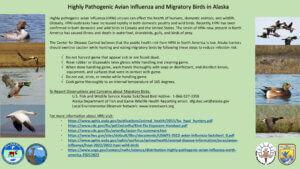 Alaska hunters should exercise caution while hunting and eating migratory birds by following these steps to reduce infection risk. Highly pathogenic avian influenza (HPAI) viruses can affect the health of humans, domestic animals, and wildlife. Globally, HPAI outbreaks have increased rapidly in both domestic poultry and wild birds. Recently, HPAI has been confirmed in both domestic and wild birds in Canada and the United States. The strain of HPAI now presents in North America has caused illness and death in waterfowl, shorebirds, gulls, and birds of prey.
Alaska hunters should exercise caution while hunting and eating migratory birds by following these steps to reduce infection risk. Highly pathogenic avian influenza (HPAI) viruses can affect the health of humans, domestic animals, and wildlife. Globally, HPAI outbreaks have increased rapidly in both domestic poultry and wild birds. Recently, HPAI has been confirmed in both domestic and wild birds in Canada and the United States. The strain of HPAI now presents in North America has caused illness and death in waterfowl, shorebirds, gulls, and birds of prey.
The Center for Disease Control believes that the public health risk from HPAI in North America is low. Alaska hunters should exercise caution while hunting and eating migratory birds by following these steps to reduce infection risk:
✓ Do not harvest game that appear sick or are found dead.
✓ Wear rubber or disposable latex gloves while handling and cleaning game.
✓ When done handling game, wash hands thoroughly with soap or disinfectant, and disinfect knives, equipment, and surfaces that were in contact with game.
✓ Do not eat, drink, or smoke while handling game.
✓ Cook game thoroughly to an internal temperature of 165 degrees.
To Report Observations and Concerns about Migratory Birds:
- U.S. Fish and Wildlife Service Alaska Sick/Dead Bird Hotline: 1-866-527-3358
- Alaska Department of Fish and Game Wildlife Health Reporting email: dfg.dwc.vet@alaska.gov
- Local Environmental Observer Network: www.leonetwork.org
For more information about HPAI visit:
- https://www.aphis.usda.gov/publications/animal_health/2015/fsc_hpai_hunters.pdf
- https://www.cdc.gov/flu/pdf/avianflu/Bird-Flu-Exposure-Handout.pdf
- https://www.cdc.gov/flu/avianflu/avian-flu-summary.htm
- https://www.aphis.usda.gov/aphis/ourfocus/animalhealth/animal-disease-information/avian/avian-influenza/hpai-2022/2022-hpai-wild-birdshttps://www.cdc.gov/flu/avianflu/avian-flu-summary.htm
- https://www.usgs.gov/centers/nwhc/science/distribution-highly-pathogenic-avian-influenza-north-america-20212022
